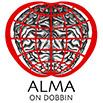
Self-portraits without Masks
2B Galéria, Budapest
János Major
October 15, 2012 throughNovember 10, 2012
Borbala Major, the daughter of the artist Janos Major (1934-2008), lives in New York City and curated this exhibition in conjunction with Alma. Major's subject matter frequently concerns Central-European Jewish identity and the enduring anti-Semitism in the region. Janos Major’s art is still largely underexposed and continues to be controversial.
-
János Major was born in 1934 into a middle-class Jewish family. His father died in 1943 in Russia, serving in the Hungarian military’s forced labor service, to which Jewish men were consigned. Together with his mother and sister, he survived the Holocaust hiding under a false identity. His artistic career took off to a promising start after he completed his studies in the late 1950s. His mentors (among them the celebrated Béla Kondor) and peers considered him particularly talented and capable. Even by his supporters, however, struggled to appreciate His more provocative works, and the authorities harassed him when he attempted to exhibit such works. In 1976 he was diagnosed with paranoid schizophrenia, triggered by personal tragedy, and hospitalized. After this, he was too ill to work for eight years. In the mid 1980s he resumed work and continued till the end of his life, despite the severity of his illness.
János Major often stated that he disliked "isms" in art, the idea that artists need to reflect fashions based on pre-fabricated trends and ideologies. He consciously cultivated what may be called an existentialist attitude, seeing art as an activity that 'brackets" the audience and the end product, and is instead concerned with the process of transformation in the artist and in his perceptions through the act of creation. Working from the inside out, he attempts to transform the private and limited into something visible and limitless. The quintessential statement on this transformative action of art is Baudelaire's often quoted passage in his epilogue to The Flowers of Evil (Les Fleurs du Mal) "Because in each thing I went to the heart of the matter, You gave me mud and I made gold out of it."
As János Major’s artistic vision matured, he focused more and more on his Jewish identity. An exercise begun for the sake of mental hygiene, to clarify and understand his own “spoiled identity” (to use Erwin Goffman's term), turned into a lifelong project. Two attitudes intersect and complement each other in his work: one is revolt and the other is self-analysis. He exteriorizes his inner scars, his "stigma," turning it upside down and throwing it back at the perpetrators; seeking a counter discourse to anti-Semitism. But Major was also keenly aware that he himself was part of the problem, that he needed to deconstruct his own self-understanding. This attitude, which combined revolt with merciless self-analysis, characterized the work of such post-war Jewish writers as Allen Ginsberg, Saul Bellow, and, to some degree, Philip Roth, whom Major often cited as his ideological parallels. In 1960s Hungary the topic of Jewish identity was off limits; to attempt a radical, unorthodox approach to it was extraordinary and daring. Major continued for the rest of his life to provoke, to broach taboos, and to turn the tradition of self portraiture into a quest for “self-clarification.”
The show “János Major: Self-portraits without a mask” is curated by the artist’s daughter, Borbala Major. The show continues the 2B Gallery tradition of “family exhibitions” that give an opportunity for reinterpreting private histories and for working through inter-generationally transmitted traumas.
© ALMA 2014
